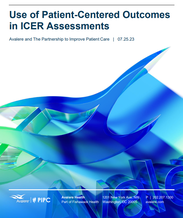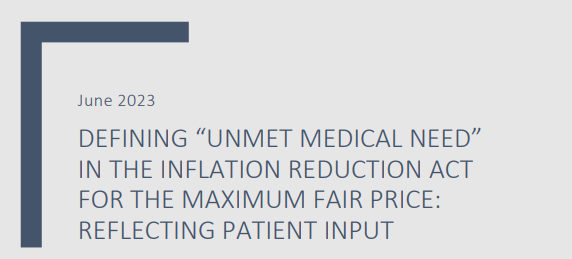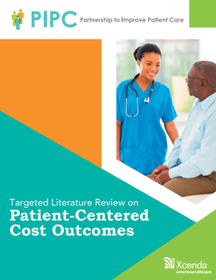| US healthcare stakeholders are increasingly expected to define the value of technology and services provided. This is especially applicable to health technology manufacturers who are responsible for demonstrating the value of their treatments to payers, providers, patients, policymakers, and other stakeholders. |
Since its inception over a decade ago, PIPC has focused on infusing patient-centricity in our health care system. We have been highly focused on patient-centered solutions for evidence-based decision-making, including advocating for the development of high-quality patient reported outcomes data and development of high quality patient-centered comparative clinical effective research, as well as opposing reliance on one-size fits all cost-effectiveness thresholds. Our goal is for high-quality patient-centered data to equip and empower patients and people with disabilities to make decisions, with their providers, about the care and treatment best to address their individual needs.

The Partnership to Improve Patient Care (PIPC), Global Liver Institute, National Minority Quality Forum, and the Preparedness & Treatment Equity Coalition have published a new report (executive summary) to assist organizations, health systems, payers, and policymakers that want to center their value assessment work on health equity.

As healthcare costs in the United States have continued to grow, there has been an increasing desire to move towards “value-based” care in which patients and payers would be paying for the “value” of the treatment patients receive. This idea has been gaining particular momentum as policymakers look for strategies to curtail spending on pharmaceuticals. While there is merit in paying for services and treatments that work and eliminating wasteful spending, it is important to step back and consider to whom “value” is being provided. As the ultimate beneficiary, we would advocate that the measure of “value” in a healthcare setting should focus on value to the patient, but currently, we are concerned that the trend is to look towards “value” to the payer by prioritizing reduced cost over care outcomes for patients in the form of cost-effectiveness analyses.

Cell and gene therapies (C>s) are revolutionary advancements that offer potentially life-altering therapies – and in some cases even cures – for patients with rare and severe diseases. Around the globe, various health technology assessment (HTA) and value assessment organizations are attempting to estimate the health and economic value of new C>s to better inform healthcare decision making. These organizations most commonly employ cost-effectiveness analysis (CEA), which seeks to determine whether the costs of a given therapy are justified by its benefits; that is, whether it is a “good buy.”
PIPC has partnered with Xcenda to quantify the extent to which ICER incorporates stakeholder input in its final assessments, particularly patients. Upon review of submitted comments, and comparing those comments to ICER’s final value assessments, Xcenda was able to quantify that patient perspectives were half as likely to be incorporated than other stakeholders. The report published today by PIPC bolsters their argument that ICER needs to take steps to improve not only its process for engagement, but also its consideration of input received from patients.
White Paper: Uses and Misuses of the QALY - Ethical Issues and Alternative Measures of Value6/21/2017
Value assessment in general, and the use of cost-effectiveness in particular, is receiving renewed interest as a tool for controlling health care spending. Currently, the most common method for determining incremental cost-effectiveness of healthcare interventions is based on a calculation of quality-adjusted-life-years (QALYs). While the model has a basic appeal for making population-level decisions (by reducing patient populations to single, aggregate numeric values), it also poses several significant concerns from the vantage point of patient-centeredness and efforts to preserve access to needed care for individual patients and people with disabilities. Of particular concern to me are the implications of use of QALYs for discrimination against people with disabilities, and its conflicting goals from the goals of personalized medicine.
|
Topics
All
Archives
April 2024
|




